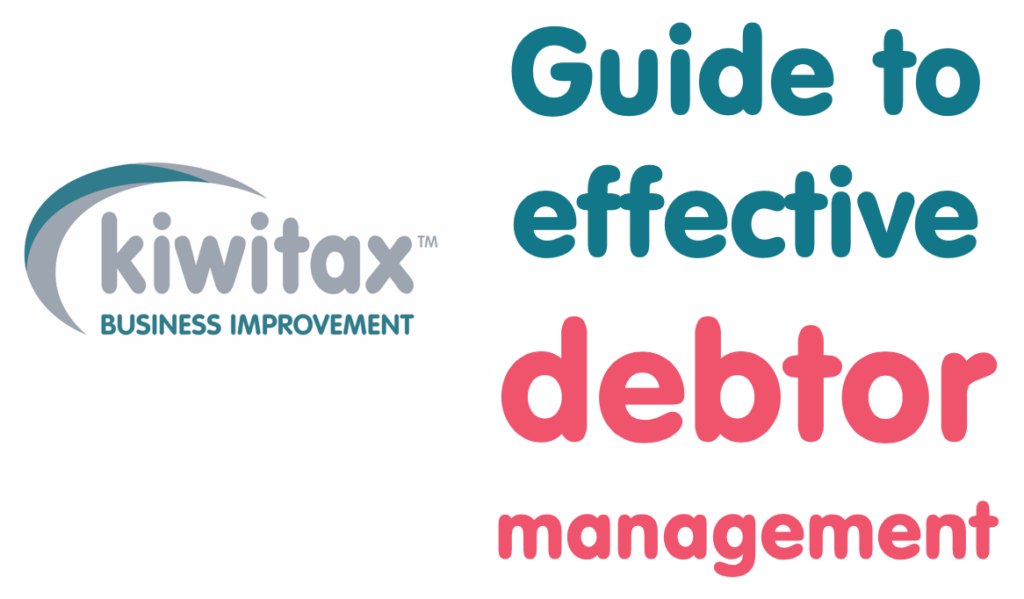Cashflow in business is like oxygen for your body, your business won’t survive long without it. So, if you have a business that offers credit to customers then having an effective debtor management process is essential.

Many businesses offering credit simply don’t think about proper management of debtors until it becomes a problem, at which point it can be too late. So not only do you not have the use of cash you are owed but now you have to spend time chasing that cash up too.
According to a study undertaken by Xero, more than half of all invoices are paid late.
Debtor management involves planning, assessing, good communications and rigorous policing. With a good debtor management strategy, your business can reduce the risk of offering credit while enjoying the benefits of being able to offer products or services on terms.
Do you need to offer credit?
Many businesses offer products or services on credit terms without actually assessing if they actually even need too.
If they do, then sometimes there are better options such as third-party financing or using a layby system like Part-pay that customers can use.
In some business where cashflow is unpredictable a solution like invoice finance & debtor finance may help bridge the cashflow gap to ensure wages, tax and creditors are kept up to date between receiving business income.
A review will help you assess what your customers actually need and want.
You should start by asking yourself and some of your customers;
- Do you need to offer credit?
- Is your product or service costly and is this a barrier to sale?
- Will offering credit bring you more customers?
- Will it make your product or service more convenient?
- Would not offering credit be a barrier to more sales?
- Would an alternative payment solution, solve the problem without adding risk to your business such as credit card payments, financing or Part-Pay instead?
If the answer to these questions is that you do need to offer credit, then you will need to develop a debtor policy.
Debtor policy
A debtor policy should clearly explain what you are offering and to whom, what the expectations are for both parties and what happens if there is a problem or a dispute.
You should set out your policy in a terms of trade document for customers that wish to enter into a credit agreement and have them sign and acknowledge these terms when they apply for credit.
When establishing what your credit terms might be, you may want to set a credit limit, to reduce the exposure to a potential bad debtor in the first instance with a review period to make adjustments if necessary.
Think about what the timeframe for repayment might be, such as cash on delivery, 7- or 14-days post invoicing or on the 20th of the month following invoicing.
Will you charge interest for the use of credit, or penalty interest if payment is made late?
Or, do you offer an incentive like a discount if they pay early?
You should set out provision in your policy for on-charging any costs related to debt collection and administration in the event that a debtor goes bad, and clearly set out what that process will involve. We suggest you engage a collection agency such as EC Credit Control to help with developing your credit policy and terms of trade in the first instance.
Establish an application process that allows you an opportunity to asses if your new customer is going to be a good fit before simply offering them credit. Most business have a credit application form that asks for specific information in order to assess applicants, seeking information such as;
- Who/what the legal entity is that will be taking on the debt?
- What is their ability to service the debt?
- Are you dealing with someone that has appropriate authority on behalf of the entity?
- If they are a business, how long have they been trading?
- Do they have any trade references?
Basically, anything you need to know that will satisfy you as to their “creditworthiness”.
Debtor management basics
Once you have developed your policy and start signing up clients to your credit offering, you need to ensure you have a robust process for reviewing your debtors performance.
Most businesses will review their aged receivables monthly, to see who might be overdue or at risk This is a standard report in most accounting software packages and will show you all of your debtors that are overdue, who is overdue by 30 days, 60 days and 90 days +.
This will help focus your attention on those with large amounts and those that a very overdue.
Most software accounting packages will also allow you to automate reminders if your debtors do become overdue.
We suggest you send your overdue debtors an automated reminder as early as 2 days after they become overdue, with a follow up phone call at 5 days to allow for an early intervention if there is a problem with them paying the account.
An example of an automated message in Xero might be;
“Hi [Contact First Name],
This a gentle reminder that your invoice for [Currency Symbol] [Amount Due Without Currency] was due on [Due Date].
If you’ve already paid it, thank you and please ignore this email. If you’ve not paid it, please do so as soon as possible or get in contact and let us know when you can bring this up to date.
To view your bill visit [Online Invoice Link].
If you’ve got any questions, please don’t hesitate to get in touch.
Thanks
[Trading Name]”
If they are unable to pay the full amount right away, you should consider providing them with an option for paying off the amount rather than just sending the debt to a collection agency as this may damage your relationship with your customer, and cost them more money. You should also limit any further credit until they bring their account up to date.
However, if they still don’t bring their account up to date, or they fail to deliver on any payment promises they make, you may be left with little choice but to consider debt collection through a collection agency.
Debt collection
If you find yourself in a situation where a debtor has failed to pay despite trying to facilitate an easier outcome and the invoice is not under dispute, you may need to send the debt to a collection agency.
With some online accounting software such as MYOB or Xero, you can do this directly in the software with the use of add-ons, EC Credit Control offer this.
Keep in mind also that should a debt go ‘bad’ this does not provide you with a tax write-off expense. A bad debt reflected within the accounts is just a way of removing previously reported income from the accounts.
EC Credit Control are one of New Zealand and Australia’s leading credit management organisations, offering full credit management and debt recovery for over 30 years to large corporate, mid-market companies and SME’s. You can contact them on 0800 324 768.
Debtor reporting and KPI’s
One of the key metrics to keep an eye on regarding debtor management is “Debtor Days”
To put it simply, debtor days measures the average number of days it takes a business to receive payment from its customers for invoices issued to them. The longer it takes to collect your debtors, the greater the number of debtor days.
The calculation of debtor days is:
(Trade receivables / Annual sales) x 365 days
For example, if a company has trade receivables of $5,000 and its annual sales are $30,000, then its debtor days is 61 days.
The calculation is: ($5,000 Trade receivables / $30,000 Annual sales) x 365 = 60.83 Debtor Days
A good health check of your debtor collection period would be to compare your debtor days against other companies in the same industry or even using benchmark data for companies in other industries to set collection targets.
Any upward trend in debtor days means that you will need to fund your business working capital needs from other sources. While your customers are taking longer to pay your business, you are having to find other ways to pay for unavoidable business expenses including wages, suppliers and taxes.
There are significant incentives to reduce your business’s debtor days such as:
- Reduction in working capital funding costs – using an overdraft to pay business expenses means incurring extra overdraft bank fees and high interest rates on the overdrawn balance.
- Avoiding short term loans – having to borrow money from banks or other loan providers, usually over a short term and incurring high interest rates.
- Supplier relationships – if you start missing payment deadlines for your suppliers you run the risk of damaging those relationships. Not only will you potentially incur late fees and interest on overdue balances but they may not be as open to negotiate lower prices on products and services.
- Lost opportunities – so while you are having to borrow to pay your business’s unavoidable business expenses, you could miss out on other investment opportunities because you are at you maximum borrowing capacity and the bank cannot provide further lending.
- Staff Moral – If you pay your employees late that will certainly impact their attitudes, job satisfaction, productivity, absence and turnover rates.
About Kiwitax – Award winning business improvement, tax and accounting service
Here’s the thing. As a business, rental property owner or start-up, you get a kick out of having your own gig. But chances are dealing with your tax and accounting leaves you cold. Good news! We love it, so hand it over to Kiwitax and we’ll look after it all for you.
Whether you deal with us online, by phone or drop into our Napier office, you’ll find a friendly, professional hardworking team ready to work with you, however you keep track of your financial information and from wherever you do business. And all for a fixed price.
Plus if you’re at a loss to know how to improve aspects of your business – from growth planning to cashflow management, even tax debt and so much more – we’re all over that too. Our Business Improvement advisors can help you make a plan and put it into action.
Kiwitax are a preferred training provider for Business Improvement services through the Regional Business Partner Network Capability Voucher Scheme. This is a government funded scheme designed to boost business capability by providing funding of up to 50% of approved training programs with specified training providers up to a maximum value of $5000.
If you liked this article and want to make improvements in your business, with quarterly coaching sessions specifically tailored to support you to identify and achieve your business goals, lets chat!



